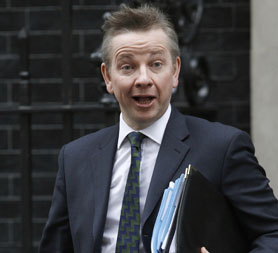Gove’s education plan ‘breathtaking ignorance’ warns union
The Education Secretary announces 200 of the worst-performing primary schools will be turned into academies by 2013. But the move has been criticised by the NUT as “breathtaking ignorance.”
In the most direct intervention in primary school education by the Coalition Government yet, Mr Gove said the process of turning 200 schools into academies could involve “significant change” in terms of staffing, and in some cases the head teacher would be removed.
Speaking at the National College for School Leadership in Birmingham, Mr Gove warned that the education debate “has not confronted reality.”
He told the conference: “As an urgent priority, we will start work on turning around the 200 schools that have most consistently underperformed by finding new academy sponsors for them so that most can reopen from September 2012.”
The government wants to turn the schools into semi-independent state schools that receive their funding directly and have more powers over areas like the curriculum and staff pay and conditions.
But unions were concerned about Mr Gove’s plans, with the National Union of Teachers (NUT) accusing him of “breathtaking ignorance” in his belief that forcing primaries to become academies would improve standards.
NUT General Secretary Christine Blower said: “Simply closing schools and replacing them with academies will not have the impact sought but will cause a great deal of confusion and distress for parents, pupils and staff.”

Minimum standards
Mr Gove said the move was designed to keep pace with rising standards across the world, especially Asia, arguing: “Education systems across the world are improving faster than England. We have to set our sights higher.”
“We should no longer tolerate a system in which so many pupils leave primary school without a good grasp of English and maths and leave secondary school without five good GCSEs,” Mr Gove continued.
There’ll also be new targets for secondary schools, with fourty per-cent of pupils being required to gain 5 A*-C grades next year, rising to 50% by 2015.
Mr Gove has already raised the target for five good GCSEs from 30% to 35% of pupils.
Those which fail could face takeover by a successful neighbouring academy school.

In the most recent round of exams, some 870 out of the 3,000 secondary schools in England fell short of the benchmark.
Mr Gove argued that academies are improving standards by providing flexibility, saying: “Evidence shows that the academy programme has had a good effect on school standards.”
“Heads and teachers should run schools and they should be more accountable to parents instead of politicians. We must go faster and further in using the programme to deal with underperforming schools,” he continued.
Accounting blunder
The funding of academies has also been criticised as it emerged that an accounting blunder has raised the possibility of many having large sums of money “clawed back”.
Mr Gove blamed mistakes by local authorities for the overpayments, which saw some academies receive hundreds of thousands of pounds they were not entitled to.
The Financial Times reported that the error was particularly pronounced in Hampshire, where academies had been given an extra £300 per pupil.